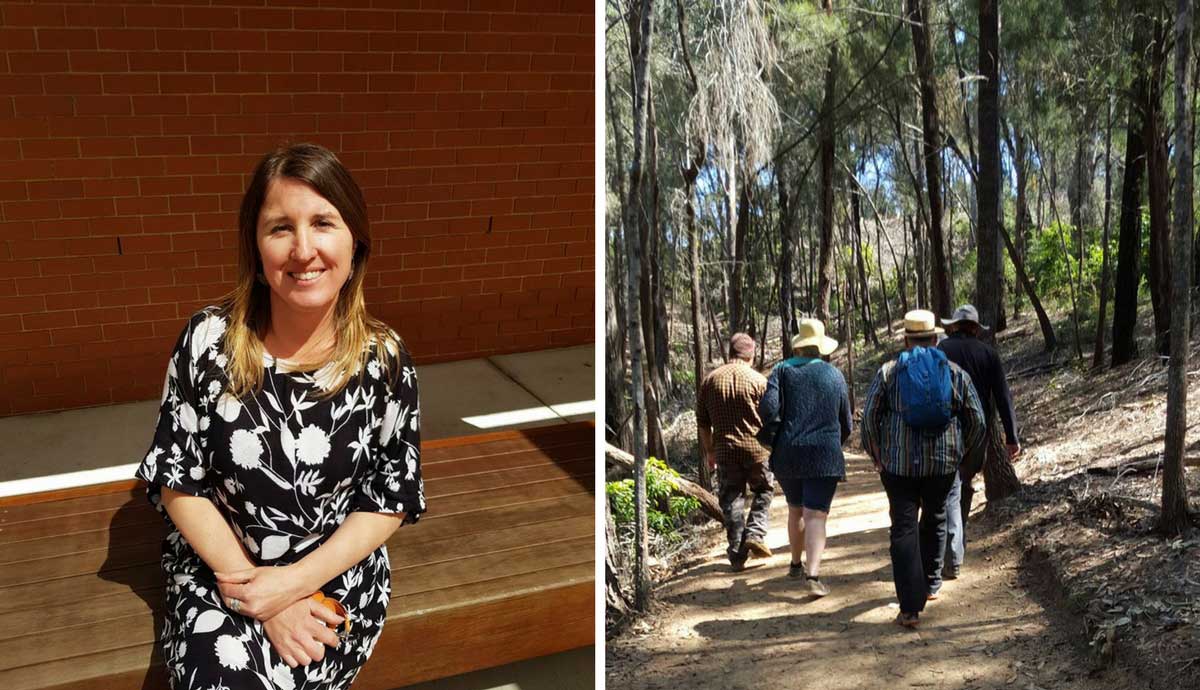October 3, 2017
UOW Bega student wins prominent NSW History Council award
PhD candidate, Jodie Stewart, investigates how the documentation of history on the Bundian Way has impacted on inter-cultural relationships.
University of Wollongong (UOW) Bega PhD candidate, Jodie Stewart, from the School of Humanities and Social Inquiry, has been awarded the History Council of NSW 2017 Deen De Bortoli Award for Applied History for her essay; ‘Emotions, Stories, Pasts: Feeling the Settler and Aboriginal Past on the Bundian Way’.
The Bundian Way is an ancient pathway linking the high country of the Snowy Mountains with the coast at Eden and is of State and national significance, as it was used by Aboriginal people over thousands of years.
With the support of local Aboriginal elders and activists working on the Bundian Way project Jodie has spent the last four years uncovering how various community members and visitors to the Bundian Way think about, evaluate and understand the Aboriginal past via cognitive and bodily encounters with Aboriginal cultural landscapes.
Her documentation of this important piece of local history explores how history and the past informs contemporary relationships, particularly those between Aboriginal and non-Aboriginal people.
Jodie explains that she has always been interested in how history is made and generated outside of the academy, as well as how history and the past impacts on contemporary relationships.
“While I was thinking about those really big issues, I was keeping my eye on the Bundian Way Project in my local area – and I could see that in the early stages of the research, already the histories that were being communicated through the project were generating really rich discussion, for example, about the nature of early cross-cultural relations between Aboriginal and settler peoples in my local area,” Jodie says.
She says she wanted to tap into the histories that were being produced, the different ways they were generated and the impact of those histories on individuals and communities. She adds the insights gained through her research have been vast.
“In my PhD, I’m looking at various sensory avenues for understandings, so I look at, for example, a project that is part of the Bundian Way Project, called the Aboriginal Women and Yams Project, or AWAY. The women engaged with this project are acquiring knowledge about the past via bodily engagements with significant places along the pathway. Elder and leader of the AWAY project Aileen Blackburn explained to me that it is being out on country ‘doing it’ that generate important knowledge and understanding”.
“There’s archival history that’s been undertaken by Aboriginal people in the community who are very active archival researchers. Informed in part by this archival work and with the help of non-Aboriginal historian John Blay, an Aboriginal survey team surveyed the pathway in 2010-2011.
“There’s also oral stories that have been passed down through generations of Aboriginal people. Very interestingly, even though the pathway may not have been walked in its entirety for over one hundred years, it still remains in the stories and memories of Aboriginal people,” Jodie says.
She explains that her study is very localised and has helped bring to light the importance of the ongoing relationship Aboriginal people have with country. In receiving her award, Jodie has acknowledged the breadth of support she has received throughout the information gathering process.
“My research would not have been possible without the help, insights and generosity of elder Ossie Cruse, Eden LALC chairperson BJ Cruse, Les Kosez, Penny Stewart, Aileen Blackburn, Warren Foster, Noel Whittem, and the young Aboriginal men and women working on the Bundian Way project. I can’t thank them enough.”
Jodie is continuing her research compilation and hopes to submit her PhD by the end of the year.
